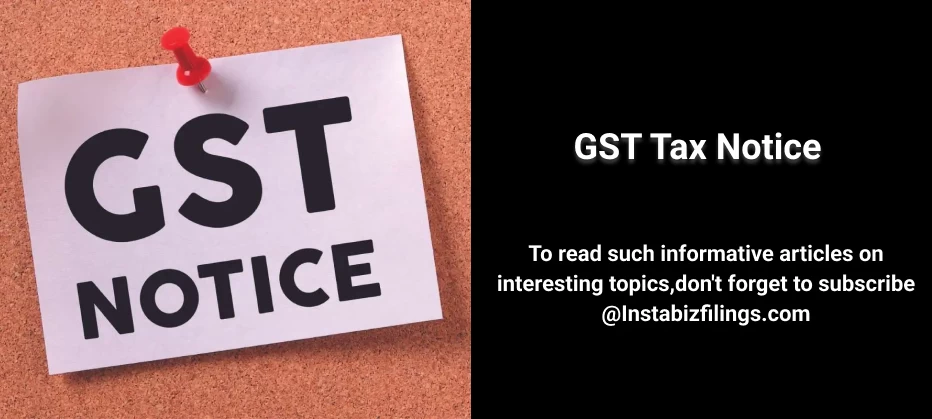
GST Tax Notice
September 17, 2025 by Team Instabizfilings
Introduction
The introduction of the Goods and Services Tax (GST) in India has made businesses adopt a single tax framework. Non-compliance, however, mismatching returns or suspicious transactions may result in the issuance of the GST Tax Notices to taxpayers by the GST department.
To prevent penalties and legal inconvenience, it is important to know what GST notices are, why they are issued and how to respond. This article will explain all you need to know about this GST tax notice.
What is a GST Tax Notice?
A GST Tax Notice is an official communication issued by the GST department to a taxpayer for various reasons, such as non-filing of returns, tax evasion, incorrect input tax credit (ITC), mismatches in returns, etc.
The notice may require the taxpayer to provide clarification, pay outstanding dues, correct their filings, or appear before the tax authority.
Common Reasons for Receiving a GST Notice
A taxpayer may receive a GST notice for several reasons, including:
-
Mismatch in data between GSTR-1 and GSTR-3B, or GSTR-2A/2B and GSTR-3B
-
Excessive or wrongful claim of Input Tax Credit (ITC)
-
Delayed or non-payment of GST liability
-
Suspected tax evasion or fraud
-
Failure to register under GST when liable
-
Discrepancies noticed during scrutiny or audit
-
Failure to respond to previous notices
-
Wrong classification of goods/services
Types of GST Notices
Here are the most commonly issued notices under GST:
- Notice for Registration – GST REG-03
-
Issued when additional information is required for GST registration.
-
Must respond using GST REG-04 within 7 working days.
- Show Cause Notice (SCN) – GST REG-17 / GST DRC-01
-
Issued for violations like cancellation of registration or tax evasion.
-
Taxpayers must reply in GST REG-18 or DRC-03.
- Notice for Return Defaults – GSTR-3A
-
Issued when GST returns are not filed on time.
-
Taxpayers must file the pending returns within 15 days.
- Scrutiny Notice – GST ASMT-10
-
Sent when discrepancies are found in returns.
-
Taxpayers must respond with explanations or corrections via ASMT-11.
- Assessment Notice – GST ASMT-14
-
Issued for best judgment assessment when a taxpayer fails to file returns even after notice.
-
The taxpayer can respond using ASMT-15.
- Audit Notice – GST ADT-01
-
Sent when the department initiates an audit.
-
The taxpayer must cooperate and submit records as required.
- Investigation or Enforcement Notices
-
May be issued under Section 67, 70, or 73/74** for inspection, search, seizure, or arrest.
-
These are serious notices requiring professional legal advice.
How to Respond to a GST Notice
It is important to reply to GST notices accurately and time-sensitively. Here’s how:
-
Read the Notice Carefully: Know the reason, part of the law and date.
-
Consult a GST Expert or CA: Do not be a self-assessor on serious matters.
-
Gather Required Documents: Turn-back filing, purchase/sale invoices, payment records, etc.
-
File Response on GST Portal: Answer the appropriate response form indicated in the notice.
-
Follow Up: Inquire with the department about acknowledgement and other instructions.
Consequences of Ignoring a GST Notice
Failure to respond or time loss in responding may result in:
-
Tax due or fine on tax.
-
GST registration cancellation
-
Audit or investigation
-
Blocking of input tax credit
-
Prosecution or law
Tips to Avoid GST Notices
-
File all GST returns on time.
-
Match ITC claims with GSTR-2B regularly.
-
Maintain proper books and records.
-
Conduct regular internal audits.
-
Stay updated with GST compliance and rules.
Conclusion
A GST tax notice is a serious matter and should never be ignored. Whether it’s a notice for non-filing, ITC mismatch, or audit, timely action and compliance can save you from financial and legal troubles. Always consult a qualified tax professional when in doubt, and ensure your GST filings are accurate and timely.
Disclaimer
The information provided in this blog is purely for general informational purposes only. While every effort has been made to ensure the accuracy, reliability and completeness of the content presented, we make no representations or warranties of any kind, express or implied, for the same.
We expressly disclaim any and all liability for any loss, damage or injury arising from or in connection with the use of or reliance on this information. This includes, but is not limited to, any direct, indirect, incidental, consequential or punitive damage.
Further, we reserve the right to make changes to the content at any time without prior notice. For specific advice tailored to your situation, we request you to get in touch with us.

Need more details? We can help! Talk to our experts now!
Start Your Business Registration – Talk to Our Experts Now!

Still Confused?
Talk to experts? Fill in the information and we will reach out in 24 Working Hours.

